Critical Skills & Competencies for Success in Management Consulting
VerifiedAdded on 2023/04/08
|9
|2367
|181
Report
AI Summary
This report identifies and analyzes the essential skills and competencies required for management consultants throughout the various stages of a consulting project. It begins by defining management consulting and its role in improving organizational performance. The report details the five stages of a consulting process: initial entry and contract phase, data collection and inquiry, interpretation and feedback, implementation, and decision of extension, recycle, or contract termination, highlighting the specific skills needed in each phase. These skills include interpersonal, communication, diagnostic, problem-solving, motivational, statistical, and time management abilities. The report emphasizes the importance of qualities such as active listening, flexibility, fairness, risk-taking, and prioritization. The conclusion underscores the critical skills and competencies a management consultant must possess to effectively serve business clients, emphasizing proactive engagement and clear understanding of client perspectives.
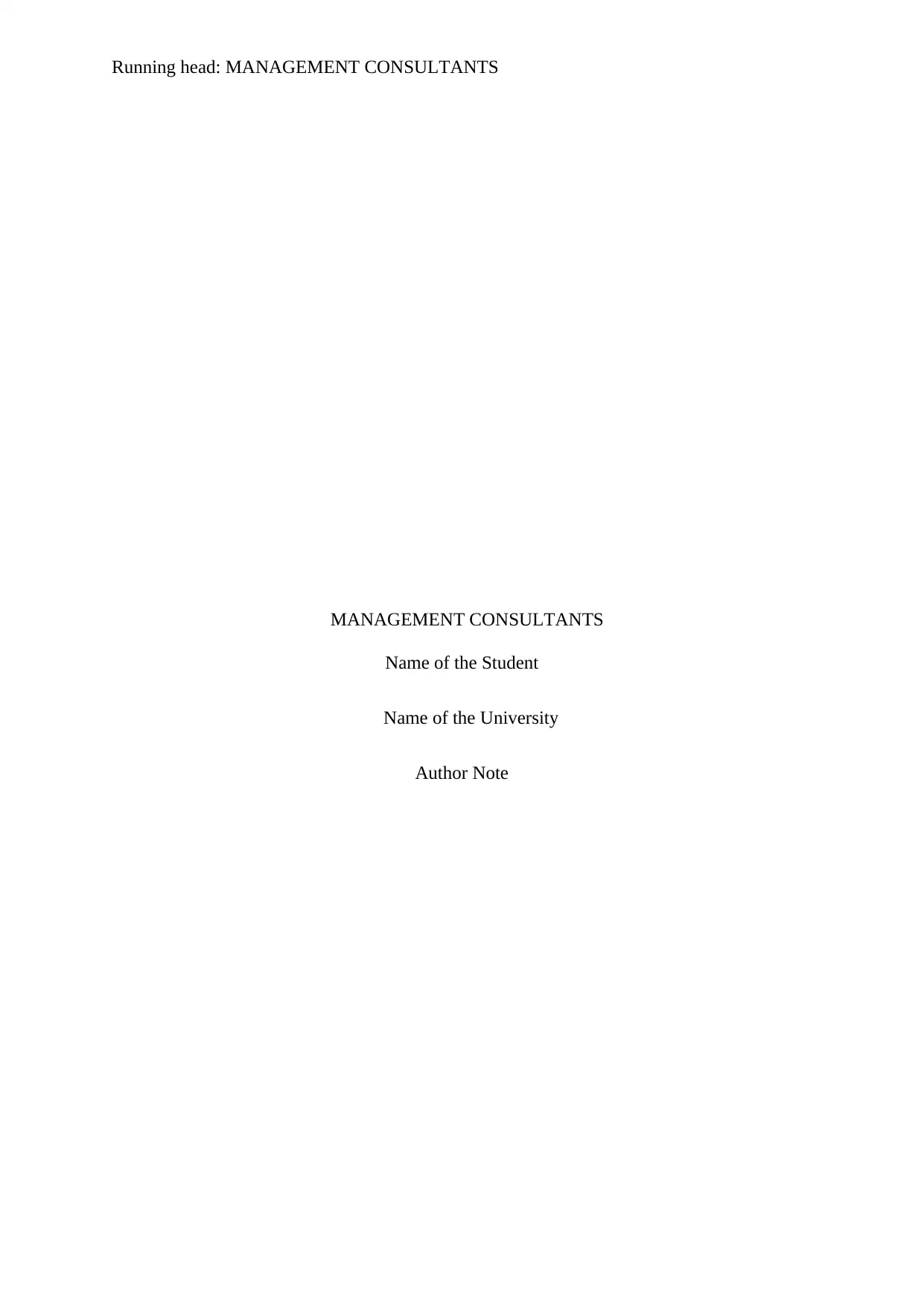
Running head: MANAGEMENT CONSULTANTS
MANAGEMENT CONSULTANTS
Name of the Student
Name of the University
Author Note
MANAGEMENT CONSULTANTS
Name of the Student
Name of the University
Author Note
Paraphrase This Document
Need a fresh take? Get an instant paraphrase of this document with our AI Paraphraser
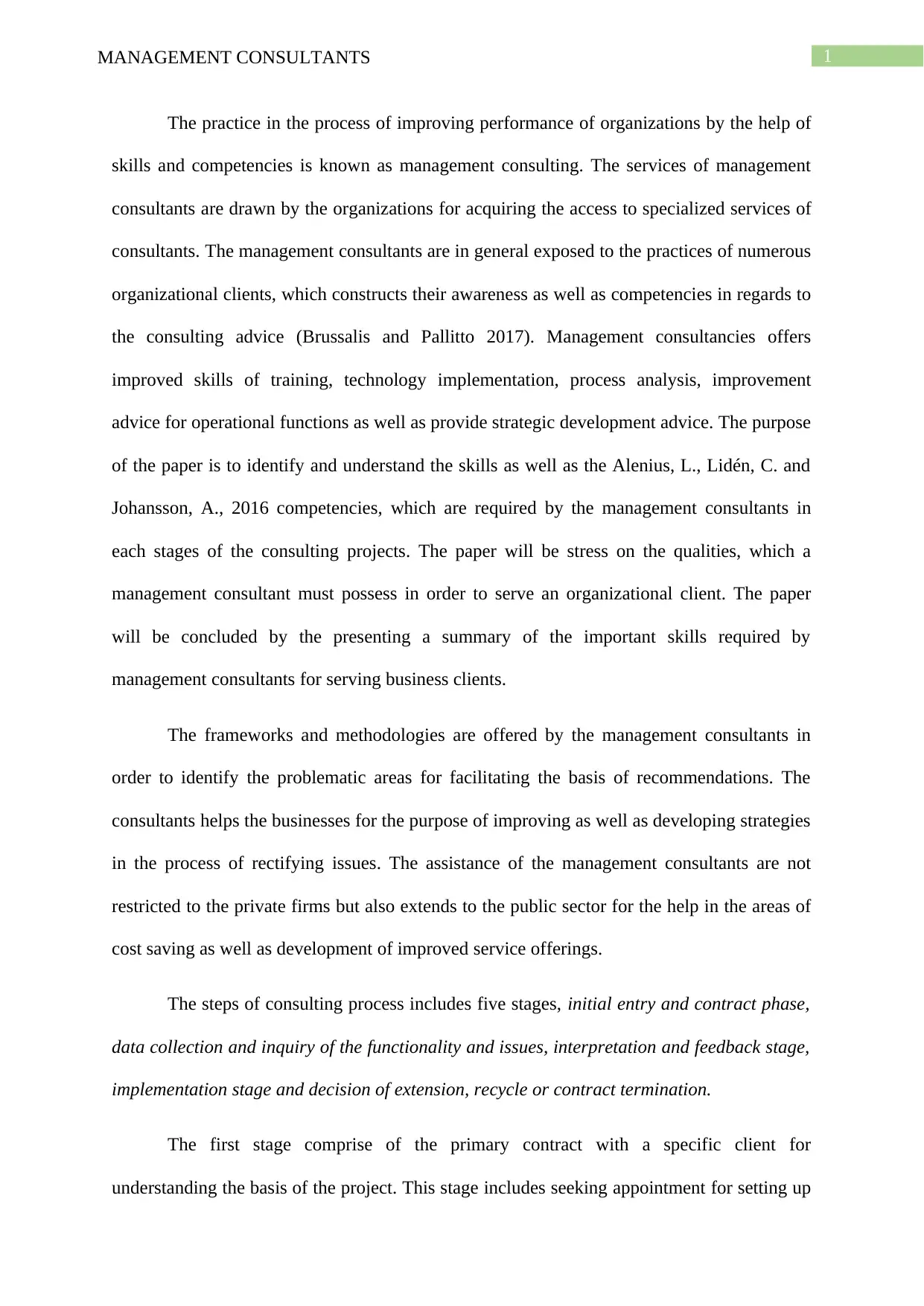
1MANAGEMENT CONSULTANTS
The practice in the process of improving performance of organizations by the help of
skills and competencies is known as management consulting. The services of management
consultants are drawn by the organizations for acquiring the access to specialized services of
consultants. The management consultants are in general exposed to the practices of numerous
organizational clients, which constructs their awareness as well as competencies in regards to
the consulting advice (Brussalis and Pallitto 2017). Management consultancies offers
improved skills of training, technology implementation, process analysis, improvement
advice for operational functions as well as provide strategic development advice. The purpose
of the paper is to identify and understand the skills as well as the Alenius, L., Lidén, C. and
Johansson, A., 2016 competencies, which are required by the management consultants in
each stages of the consulting projects. The paper will be stress on the qualities, which a
management consultant must possess in order to serve an organizational client. The paper
will be concluded by the presenting a summary of the important skills required by
management consultants for serving business clients.
The frameworks and methodologies are offered by the management consultants in
order to identify the problematic areas for facilitating the basis of recommendations. The
consultants helps the businesses for the purpose of improving as well as developing strategies
in the process of rectifying issues. The assistance of the management consultants are not
restricted to the private firms but also extends to the public sector for the help in the areas of
cost saving as well as development of improved service offerings.
The steps of consulting process includes five stages, initial entry and contract phase,
data collection and inquiry of the functionality and issues, interpretation and feedback stage,
implementation stage and decision of extension, recycle or contract termination.
The first stage comprise of the primary contract with a specific client for
understanding the basis of the project. This stage includes seeking appointment for setting up
The practice in the process of improving performance of organizations by the help of
skills and competencies is known as management consulting. The services of management
consultants are drawn by the organizations for acquiring the access to specialized services of
consultants. The management consultants are in general exposed to the practices of numerous
organizational clients, which constructs their awareness as well as competencies in regards to
the consulting advice (Brussalis and Pallitto 2017). Management consultancies offers
improved skills of training, technology implementation, process analysis, improvement
advice for operational functions as well as provide strategic development advice. The purpose
of the paper is to identify and understand the skills as well as the Alenius, L., Lidén, C. and
Johansson, A., 2016 competencies, which are required by the management consultants in
each stages of the consulting projects. The paper will be stress on the qualities, which a
management consultant must possess in order to serve an organizational client. The paper
will be concluded by the presenting a summary of the important skills required by
management consultants for serving business clients.
The frameworks and methodologies are offered by the management consultants in
order to identify the problematic areas for facilitating the basis of recommendations. The
consultants helps the businesses for the purpose of improving as well as developing strategies
in the process of rectifying issues. The assistance of the management consultants are not
restricted to the private firms but also extends to the public sector for the help in the areas of
cost saving as well as development of improved service offerings.
The steps of consulting process includes five stages, initial entry and contract phase,
data collection and inquiry of the functionality and issues, interpretation and feedback stage,
implementation stage and decision of extension, recycle or contract termination.
The first stage comprise of the primary contract with a specific client for
understanding the basis of the project. This stage includes seeking appointment for setting up
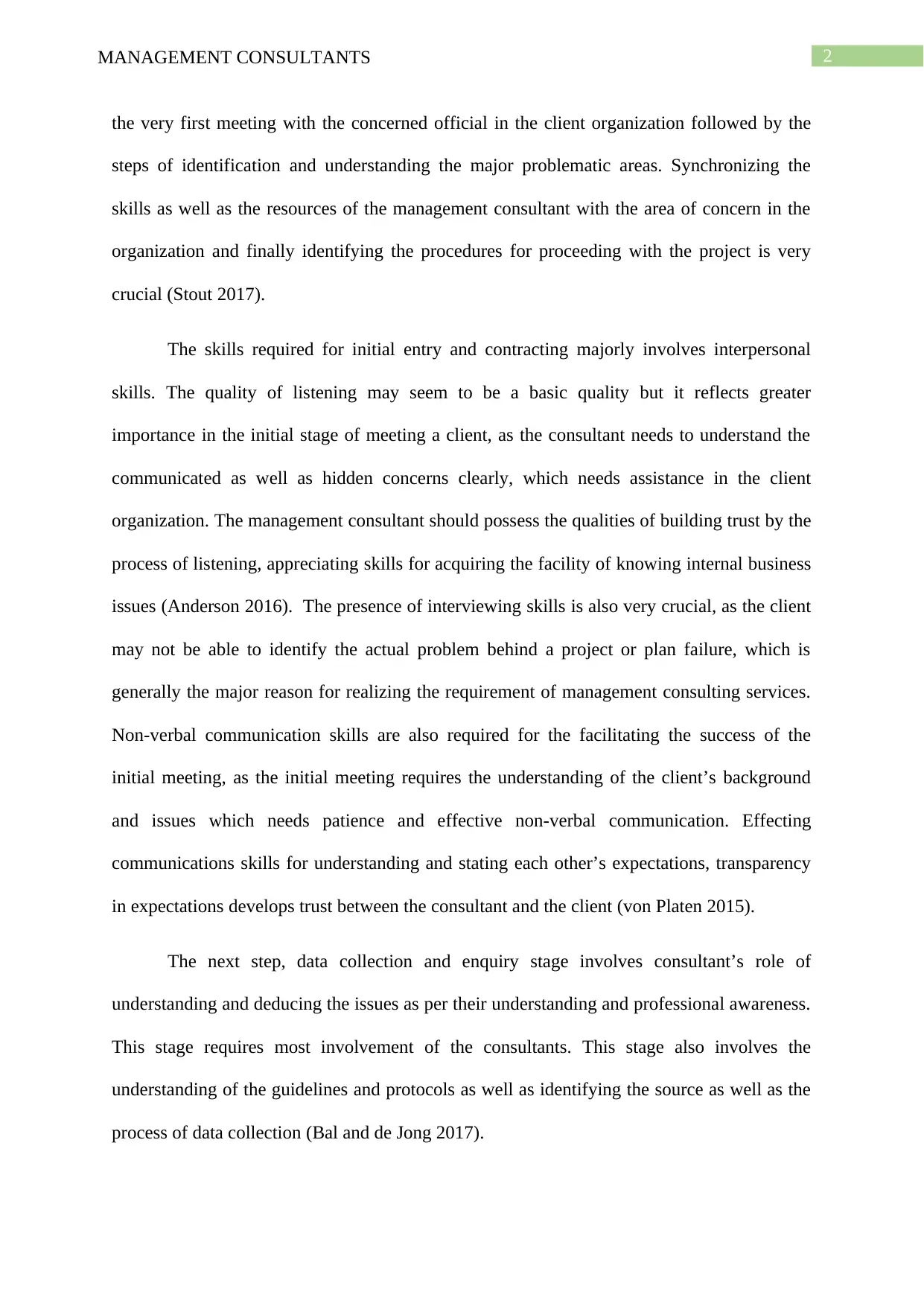
2MANAGEMENT CONSULTANTS
the very first meeting with the concerned official in the client organization followed by the
steps of identification and understanding the major problematic areas. Synchronizing the
skills as well as the resources of the management consultant with the area of concern in the
organization and finally identifying the procedures for proceeding with the project is very
crucial (Stout 2017).
The skills required for initial entry and contracting majorly involves interpersonal
skills. The quality of listening may seem to be a basic quality but it reflects greater
importance in the initial stage of meeting a client, as the consultant needs to understand the
communicated as well as hidden concerns clearly, which needs assistance in the client
organization. The management consultant should possess the qualities of building trust by the
process of listening, appreciating skills for acquiring the facility of knowing internal business
issues (Anderson 2016). The presence of interviewing skills is also very crucial, as the client
may not be able to identify the actual problem behind a project or plan failure, which is
generally the major reason for realizing the requirement of management consulting services.
Non-verbal communication skills are also required for the facilitating the success of the
initial meeting, as the initial meeting requires the understanding of the client’s background
and issues which needs patience and effective non-verbal communication. Effecting
communications skills for understanding and stating each other’s expectations, transparency
in expectations develops trust between the consultant and the client (von Platen 2015).
The next step, data collection and enquiry stage involves consultant’s role of
understanding and deducing the issues as per their understanding and professional awareness.
This stage requires most involvement of the consultants. This stage also involves the
understanding of the guidelines and protocols as well as identifying the source as well as the
process of data collection (Bal and de Jong 2017).
the very first meeting with the concerned official in the client organization followed by the
steps of identification and understanding the major problematic areas. Synchronizing the
skills as well as the resources of the management consultant with the area of concern in the
organization and finally identifying the procedures for proceeding with the project is very
crucial (Stout 2017).
The skills required for initial entry and contracting majorly involves interpersonal
skills. The quality of listening may seem to be a basic quality but it reflects greater
importance in the initial stage of meeting a client, as the consultant needs to understand the
communicated as well as hidden concerns clearly, which needs assistance in the client
organization. The management consultant should possess the qualities of building trust by the
process of listening, appreciating skills for acquiring the facility of knowing internal business
issues (Anderson 2016). The presence of interviewing skills is also very crucial, as the client
may not be able to identify the actual problem behind a project or plan failure, which is
generally the major reason for realizing the requirement of management consulting services.
Non-verbal communication skills are also required for the facilitating the success of the
initial meeting, as the initial meeting requires the understanding of the client’s background
and issues which needs patience and effective non-verbal communication. Effecting
communications skills for understanding and stating each other’s expectations, transparency
in expectations develops trust between the consultant and the client (von Platen 2015).
The next step, data collection and enquiry stage involves consultant’s role of
understanding and deducing the issues as per their understanding and professional awareness.
This stage requires most involvement of the consultants. This stage also involves the
understanding of the guidelines and protocols as well as identifying the source as well as the
process of data collection (Bal and de Jong 2017).
⊘ This is a preview!⊘
Do you want full access?
Subscribe today to unlock all pages.

Trusted by 1+ million students worldwide
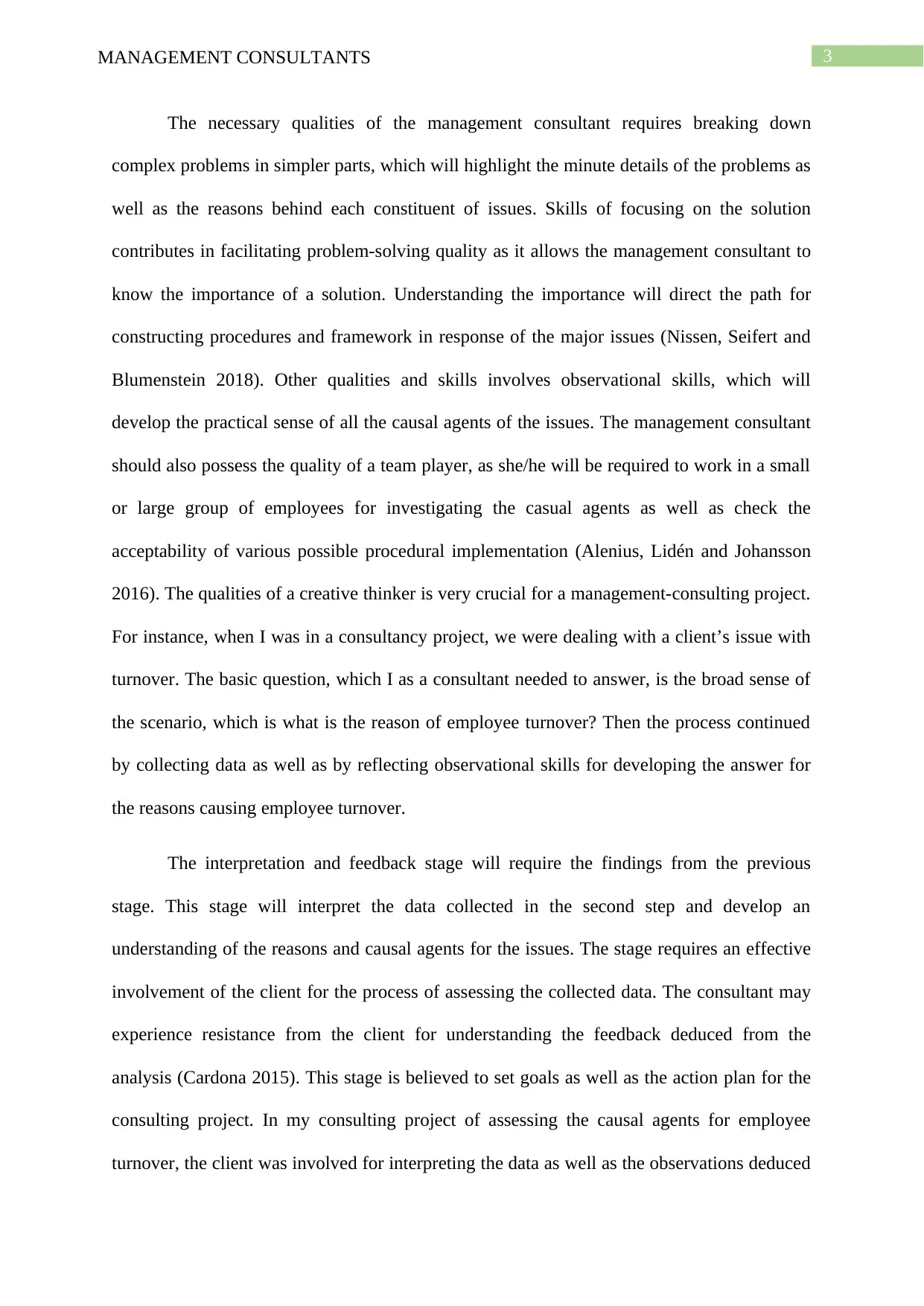
3MANAGEMENT CONSULTANTS
The necessary qualities of the management consultant requires breaking down
complex problems in simpler parts, which will highlight the minute details of the problems as
well as the reasons behind each constituent of issues. Skills of focusing on the solution
contributes in facilitating problem-solving quality as it allows the management consultant to
know the importance of a solution. Understanding the importance will direct the path for
constructing procedures and framework in response of the major issues (Nissen, Seifert and
Blumenstein 2018). Other qualities and skills involves observational skills, which will
develop the practical sense of all the causal agents of the issues. The management consultant
should also possess the quality of a team player, as she/he will be required to work in a small
or large group of employees for investigating the casual agents as well as check the
acceptability of various possible procedural implementation (Alenius, Lidén and Johansson
2016). The qualities of a creative thinker is very crucial for a management-consulting project.
For instance, when I was in a consultancy project, we were dealing with a client’s issue with
turnover. The basic question, which I as a consultant needed to answer, is the broad sense of
the scenario, which is what is the reason of employee turnover? Then the process continued
by collecting data as well as by reflecting observational skills for developing the answer for
the reasons causing employee turnover.
The interpretation and feedback stage will require the findings from the previous
stage. This stage will interpret the data collected in the second step and develop an
understanding of the reasons and causal agents for the issues. The stage requires an effective
involvement of the client for the process of assessing the collected data. The consultant may
experience resistance from the client for understanding the feedback deduced from the
analysis (Cardona 2015). This stage is believed to set goals as well as the action plan for the
consulting project. In my consulting project of assessing the causal agents for employee
turnover, the client was involved for interpreting the data as well as the observations deduced
The necessary qualities of the management consultant requires breaking down
complex problems in simpler parts, which will highlight the minute details of the problems as
well as the reasons behind each constituent of issues. Skills of focusing on the solution
contributes in facilitating problem-solving quality as it allows the management consultant to
know the importance of a solution. Understanding the importance will direct the path for
constructing procedures and framework in response of the major issues (Nissen, Seifert and
Blumenstein 2018). Other qualities and skills involves observational skills, which will
develop the practical sense of all the causal agents of the issues. The management consultant
should also possess the quality of a team player, as she/he will be required to work in a small
or large group of employees for investigating the casual agents as well as check the
acceptability of various possible procedural implementation (Alenius, Lidén and Johansson
2016). The qualities of a creative thinker is very crucial for a management-consulting project.
For instance, when I was in a consultancy project, we were dealing with a client’s issue with
turnover. The basic question, which I as a consultant needed to answer, is the broad sense of
the scenario, which is what is the reason of employee turnover? Then the process continued
by collecting data as well as by reflecting observational skills for developing the answer for
the reasons causing employee turnover.
The interpretation and feedback stage will require the findings from the previous
stage. This stage will interpret the data collected in the second step and develop an
understanding of the reasons and causal agents for the issues. The stage requires an effective
involvement of the client for the process of assessing the collected data. The consultant may
experience resistance from the client for understanding the feedback deduced from the
analysis (Cardona 2015). This stage is believed to set goals as well as the action plan for the
consulting project. In my consulting project of assessing the causal agents for employee
turnover, the client was involved for interpreting the data as well as the observations deduced
Paraphrase This Document
Need a fresh take? Get an instant paraphrase of this document with our AI Paraphraser
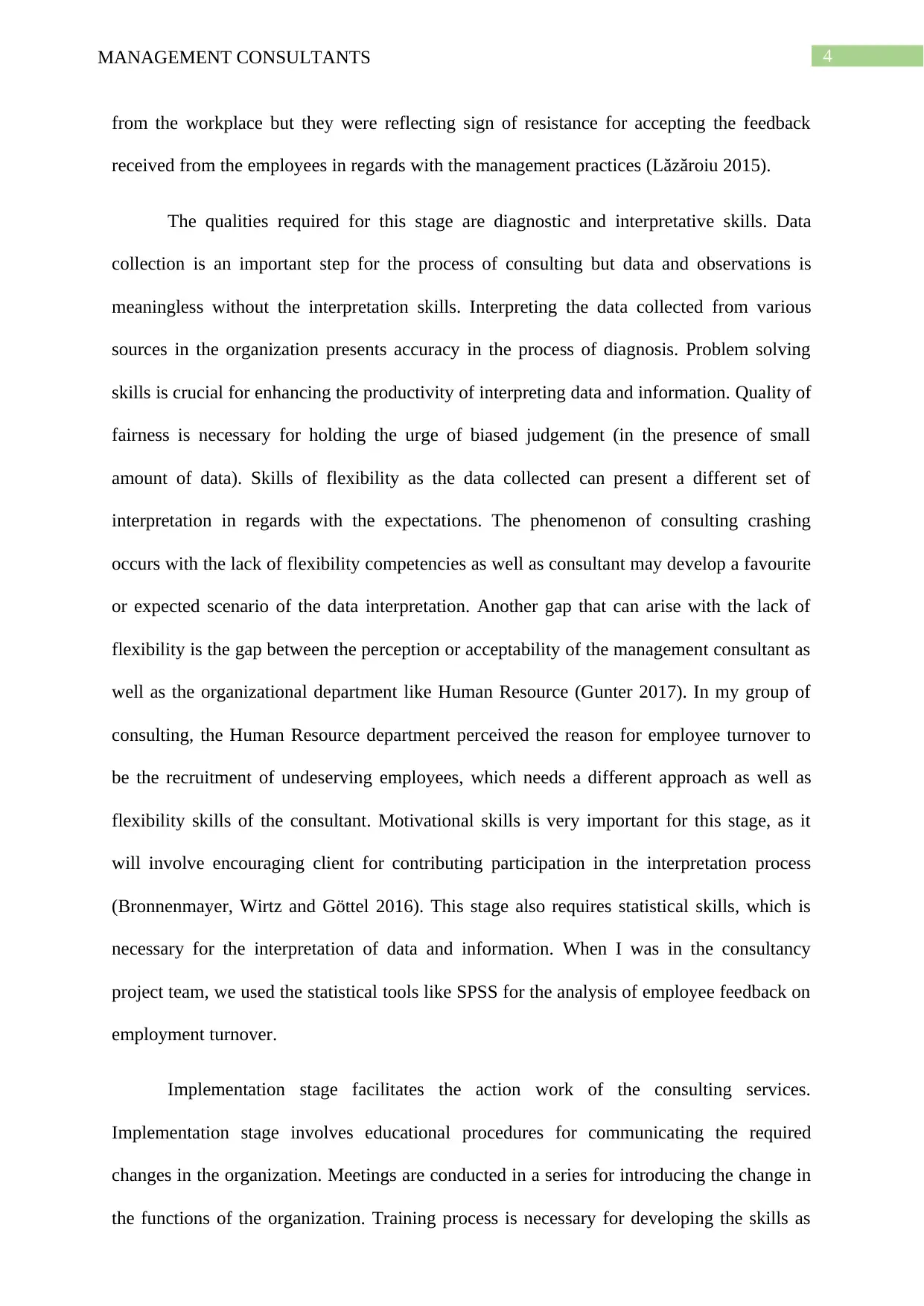
4MANAGEMENT CONSULTANTS
from the workplace but they were reflecting sign of resistance for accepting the feedback
received from the employees in regards with the management practices (Lăzăroiu 2015).
The qualities required for this stage are diagnostic and interpretative skills. Data
collection is an important step for the process of consulting but data and observations is
meaningless without the interpretation skills. Interpreting the data collected from various
sources in the organization presents accuracy in the process of diagnosis. Problem solving
skills is crucial for enhancing the productivity of interpreting data and information. Quality of
fairness is necessary for holding the urge of biased judgement (in the presence of small
amount of data). Skills of flexibility as the data collected can present a different set of
interpretation in regards with the expectations. The phenomenon of consulting crashing
occurs with the lack of flexibility competencies as well as consultant may develop a favourite
or expected scenario of the data interpretation. Another gap that can arise with the lack of
flexibility is the gap between the perception or acceptability of the management consultant as
well as the organizational department like Human Resource (Gunter 2017). In my group of
consulting, the Human Resource department perceived the reason for employee turnover to
be the recruitment of undeserving employees, which needs a different approach as well as
flexibility skills of the consultant. Motivational skills is very important for this stage, as it
will involve encouraging client for contributing participation in the interpretation process
(Bronnenmayer, Wirtz and Göttel 2016). This stage also requires statistical skills, which is
necessary for the interpretation of data and information. When I was in the consultancy
project team, we used the statistical tools like SPSS for the analysis of employee feedback on
employment turnover.
Implementation stage facilitates the action work of the consulting services.
Implementation stage involves educational procedures for communicating the required
changes in the organization. Meetings are conducted in a series for introducing the change in
the functions of the organization. Training process is necessary for developing the skills as
from the workplace but they were reflecting sign of resistance for accepting the feedback
received from the employees in regards with the management practices (Lăzăroiu 2015).
The qualities required for this stage are diagnostic and interpretative skills. Data
collection is an important step for the process of consulting but data and observations is
meaningless without the interpretation skills. Interpreting the data collected from various
sources in the organization presents accuracy in the process of diagnosis. Problem solving
skills is crucial for enhancing the productivity of interpreting data and information. Quality of
fairness is necessary for holding the urge of biased judgement (in the presence of small
amount of data). Skills of flexibility as the data collected can present a different set of
interpretation in regards with the expectations. The phenomenon of consulting crashing
occurs with the lack of flexibility competencies as well as consultant may develop a favourite
or expected scenario of the data interpretation. Another gap that can arise with the lack of
flexibility is the gap between the perception or acceptability of the management consultant as
well as the organizational department like Human Resource (Gunter 2017). In my group of
consulting, the Human Resource department perceived the reason for employee turnover to
be the recruitment of undeserving employees, which needs a different approach as well as
flexibility skills of the consultant. Motivational skills is very important for this stage, as it
will involve encouraging client for contributing participation in the interpretation process
(Bronnenmayer, Wirtz and Göttel 2016). This stage also requires statistical skills, which is
necessary for the interpretation of data and information. When I was in the consultancy
project team, we used the statistical tools like SPSS for the analysis of employee feedback on
employment turnover.
Implementation stage facilitates the action work of the consulting services.
Implementation stage involves educational procedures for communicating the required
changes in the organization. Meetings are conducted in a series for introducing the change in
the functions of the organization. Training process is necessary for developing the skills as
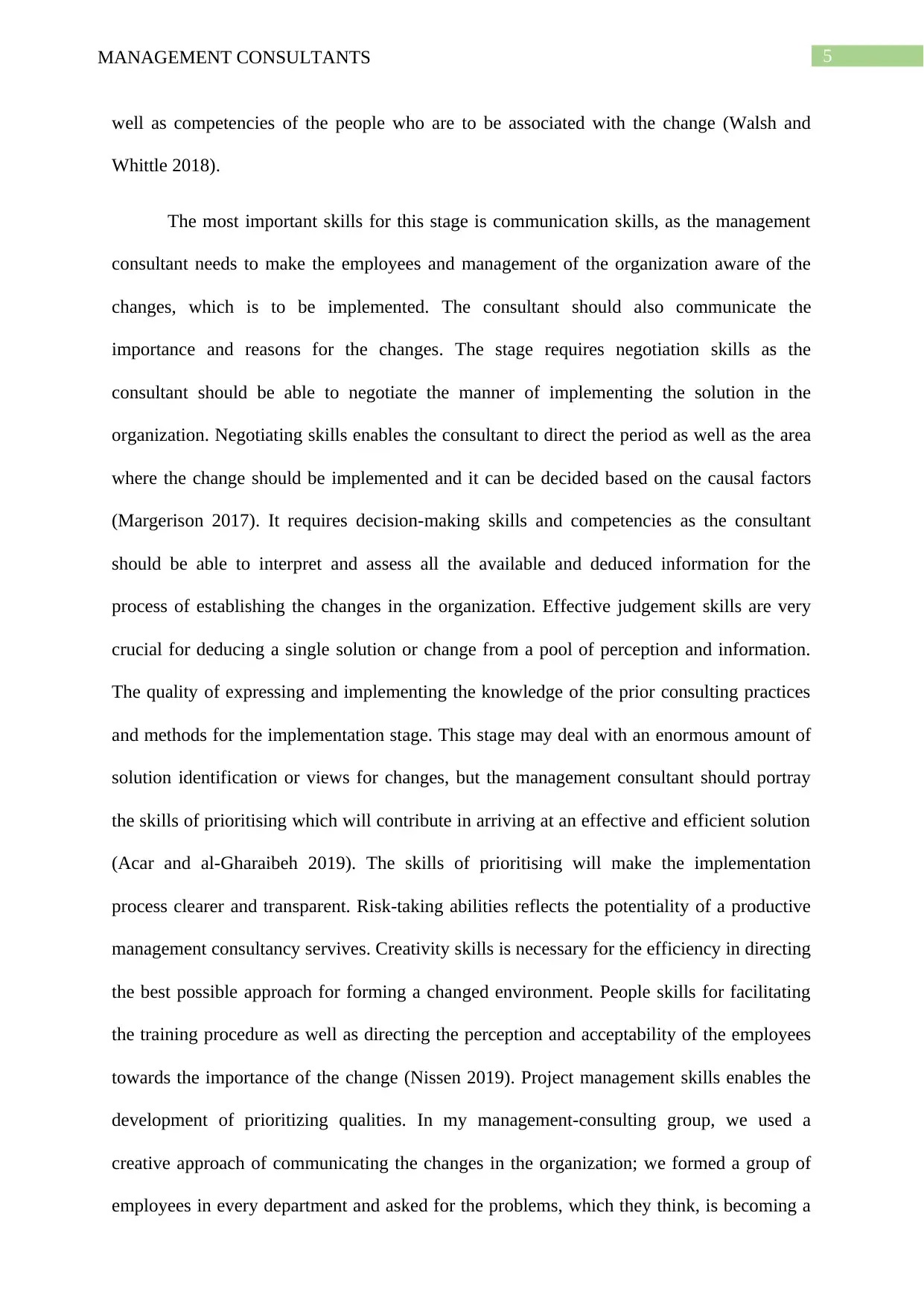
5MANAGEMENT CONSULTANTS
well as competencies of the people who are to be associated with the change (Walsh and
Whittle 2018).
The most important skills for this stage is communication skills, as the management
consultant needs to make the employees and management of the organization aware of the
changes, which is to be implemented. The consultant should also communicate the
importance and reasons for the changes. The stage requires negotiation skills as the
consultant should be able to negotiate the manner of implementing the solution in the
organization. Negotiating skills enables the consultant to direct the period as well as the area
where the change should be implemented and it can be decided based on the causal factors
(Margerison 2017). It requires decision-making skills and competencies as the consultant
should be able to interpret and assess all the available and deduced information for the
process of establishing the changes in the organization. Effective judgement skills are very
crucial for deducing a single solution or change from a pool of perception and information.
The quality of expressing and implementing the knowledge of the prior consulting practices
and methods for the implementation stage. This stage may deal with an enormous amount of
solution identification or views for changes, but the management consultant should portray
the skills of prioritising which will contribute in arriving at an effective and efficient solution
(Acar and al-Gharaibeh 2019). The skills of prioritising will make the implementation
process clearer and transparent. Risk-taking abilities reflects the potentiality of a productive
management consultancy servives. Creativity skills is necessary for the efficiency in directing
the best possible approach for forming a changed environment. People skills for facilitating
the training procedure as well as directing the perception and acceptability of the employees
towards the importance of the change (Nissen 2019). Project management skills enables the
development of prioritizing qualities. In my management-consulting group, we used a
creative approach of communicating the changes in the organization; we formed a group of
employees in every department and asked for the problems, which they think, is becoming a
well as competencies of the people who are to be associated with the change (Walsh and
Whittle 2018).
The most important skills for this stage is communication skills, as the management
consultant needs to make the employees and management of the organization aware of the
changes, which is to be implemented. The consultant should also communicate the
importance and reasons for the changes. The stage requires negotiation skills as the
consultant should be able to negotiate the manner of implementing the solution in the
organization. Negotiating skills enables the consultant to direct the period as well as the area
where the change should be implemented and it can be decided based on the causal factors
(Margerison 2017). It requires decision-making skills and competencies as the consultant
should be able to interpret and assess all the available and deduced information for the
process of establishing the changes in the organization. Effective judgement skills are very
crucial for deducing a single solution or change from a pool of perception and information.
The quality of expressing and implementing the knowledge of the prior consulting practices
and methods for the implementation stage. This stage may deal with an enormous amount of
solution identification or views for changes, but the management consultant should portray
the skills of prioritising which will contribute in arriving at an effective and efficient solution
(Acar and al-Gharaibeh 2019). The skills of prioritising will make the implementation
process clearer and transparent. Risk-taking abilities reflects the potentiality of a productive
management consultancy servives. Creativity skills is necessary for the efficiency in directing
the best possible approach for forming a changed environment. People skills for facilitating
the training procedure as well as directing the perception and acceptability of the employees
towards the importance of the change (Nissen 2019). Project management skills enables the
development of prioritizing qualities. In my management-consulting group, we used a
creative approach of communicating the changes in the organization; we formed a group of
employees in every department and asked for the problems, which they think, is becoming a
⊘ This is a preview!⊘
Do you want full access?
Subscribe today to unlock all pages.

Trusted by 1+ million students worldwide
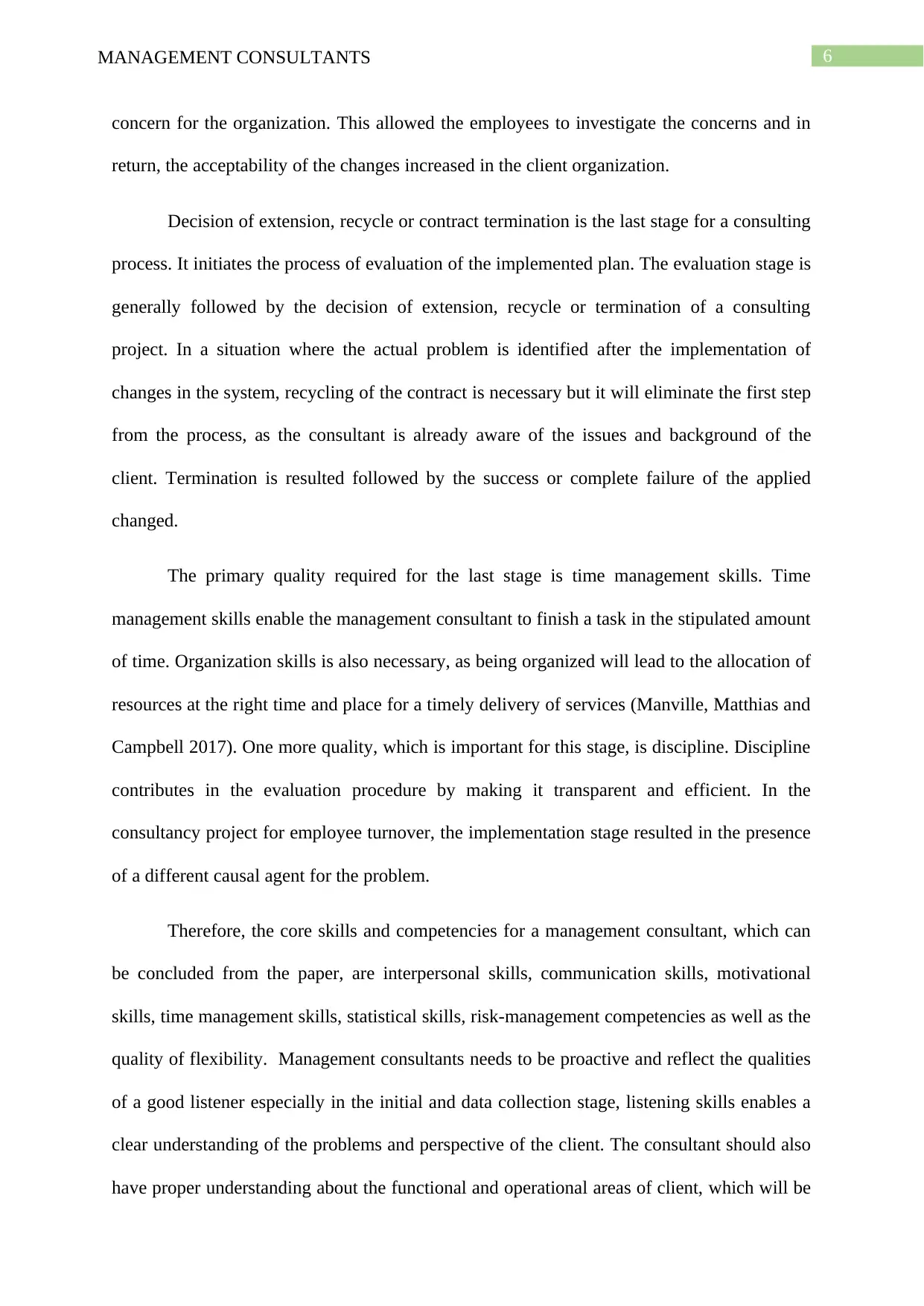
6MANAGEMENT CONSULTANTS
concern for the organization. This allowed the employees to investigate the concerns and in
return, the acceptability of the changes increased in the client organization.
Decision of extension, recycle or contract termination is the last stage for a consulting
process. It initiates the process of evaluation of the implemented plan. The evaluation stage is
generally followed by the decision of extension, recycle or termination of a consulting
project. In a situation where the actual problem is identified after the implementation of
changes in the system, recycling of the contract is necessary but it will eliminate the first step
from the process, as the consultant is already aware of the issues and background of the
client. Termination is resulted followed by the success or complete failure of the applied
changed.
The primary quality required for the last stage is time management skills. Time
management skills enable the management consultant to finish a task in the stipulated amount
of time. Organization skills is also necessary, as being organized will lead to the allocation of
resources at the right time and place for a timely delivery of services (Manville, Matthias and
Campbell 2017). One more quality, which is important for this stage, is discipline. Discipline
contributes in the evaluation procedure by making it transparent and efficient. In the
consultancy project for employee turnover, the implementation stage resulted in the presence
of a different causal agent for the problem.
Therefore, the core skills and competencies for a management consultant, which can
be concluded from the paper, are interpersonal skills, communication skills, motivational
skills, time management skills, statistical skills, risk-management competencies as well as the
quality of flexibility. Management consultants needs to be proactive and reflect the qualities
of a good listener especially in the initial and data collection stage, listening skills enables a
clear understanding of the problems and perspective of the client. The consultant should also
have proper understanding about the functional and operational areas of client, which will be
concern for the organization. This allowed the employees to investigate the concerns and in
return, the acceptability of the changes increased in the client organization.
Decision of extension, recycle or contract termination is the last stage for a consulting
process. It initiates the process of evaluation of the implemented plan. The evaluation stage is
generally followed by the decision of extension, recycle or termination of a consulting
project. In a situation where the actual problem is identified after the implementation of
changes in the system, recycling of the contract is necessary but it will eliminate the first step
from the process, as the consultant is already aware of the issues and background of the
client. Termination is resulted followed by the success or complete failure of the applied
changed.
The primary quality required for the last stage is time management skills. Time
management skills enable the management consultant to finish a task in the stipulated amount
of time. Organization skills is also necessary, as being organized will lead to the allocation of
resources at the right time and place for a timely delivery of services (Manville, Matthias and
Campbell 2017). One more quality, which is important for this stage, is discipline. Discipline
contributes in the evaluation procedure by making it transparent and efficient. In the
consultancy project for employee turnover, the implementation stage resulted in the presence
of a different causal agent for the problem.
Therefore, the core skills and competencies for a management consultant, which can
be concluded from the paper, are interpersonal skills, communication skills, motivational
skills, time management skills, statistical skills, risk-management competencies as well as the
quality of flexibility. Management consultants needs to be proactive and reflect the qualities
of a good listener especially in the initial and data collection stage, listening skills enables a
clear understanding of the problems and perspective of the client. The consultant should also
have proper understanding about the functional and operational areas of client, which will be
Paraphrase This Document
Need a fresh take? Get an instant paraphrase of this document with our AI Paraphraser
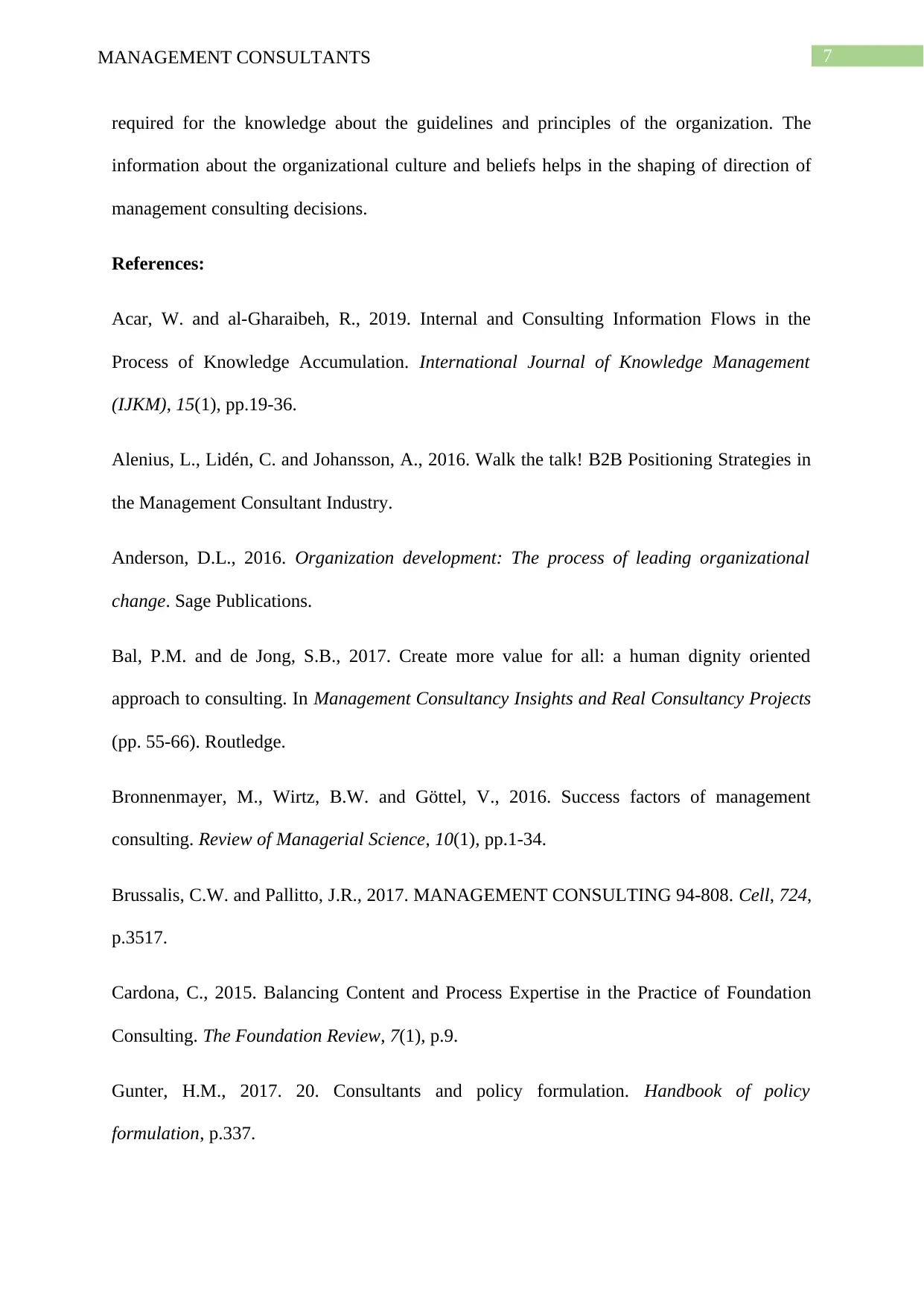
7MANAGEMENT CONSULTANTS
required for the knowledge about the guidelines and principles of the organization. The
information about the organizational culture and beliefs helps in the shaping of direction of
management consulting decisions.
References:
Acar, W. and al-Gharaibeh, R., 2019. Internal and Consulting Information Flows in the
Process of Knowledge Accumulation. International Journal of Knowledge Management
(IJKM), 15(1), pp.19-36.
Alenius, L., Lidén, C. and Johansson, A., 2016. Walk the talk! B2B Positioning Strategies in
the Management Consultant Industry.
Anderson, D.L., 2016. Organization development: The process of leading organizational
change. Sage Publications.
Bal, P.M. and de Jong, S.B., 2017. Create more value for all: a human dignity oriented
approach to consulting. In Management Consultancy Insights and Real Consultancy Projects
(pp. 55-66). Routledge.
Bronnenmayer, M., Wirtz, B.W. and Göttel, V., 2016. Success factors of management
consulting. Review of Managerial Science, 10(1), pp.1-34.
Brussalis, C.W. and Pallitto, J.R., 2017. MANAGEMENT CONSULTING 94-808. Cell, 724,
p.3517.
Cardona, C., 2015. Balancing Content and Process Expertise in the Practice of Foundation
Consulting. The Foundation Review, 7(1), p.9.
Gunter, H.M., 2017. 20. Consultants and policy formulation. Handbook of policy
formulation, p.337.
required for the knowledge about the guidelines and principles of the organization. The
information about the organizational culture and beliefs helps in the shaping of direction of
management consulting decisions.
References:
Acar, W. and al-Gharaibeh, R., 2019. Internal and Consulting Information Flows in the
Process of Knowledge Accumulation. International Journal of Knowledge Management
(IJKM), 15(1), pp.19-36.
Alenius, L., Lidén, C. and Johansson, A., 2016. Walk the talk! B2B Positioning Strategies in
the Management Consultant Industry.
Anderson, D.L., 2016. Organization development: The process of leading organizational
change. Sage Publications.
Bal, P.M. and de Jong, S.B., 2017. Create more value for all: a human dignity oriented
approach to consulting. In Management Consultancy Insights and Real Consultancy Projects
(pp. 55-66). Routledge.
Bronnenmayer, M., Wirtz, B.W. and Göttel, V., 2016. Success factors of management
consulting. Review of Managerial Science, 10(1), pp.1-34.
Brussalis, C.W. and Pallitto, J.R., 2017. MANAGEMENT CONSULTING 94-808. Cell, 724,
p.3517.
Cardona, C., 2015. Balancing Content and Process Expertise in the Practice of Foundation
Consulting. The Foundation Review, 7(1), p.9.
Gunter, H.M., 2017. 20. Consultants and policy formulation. Handbook of policy
formulation, p.337.
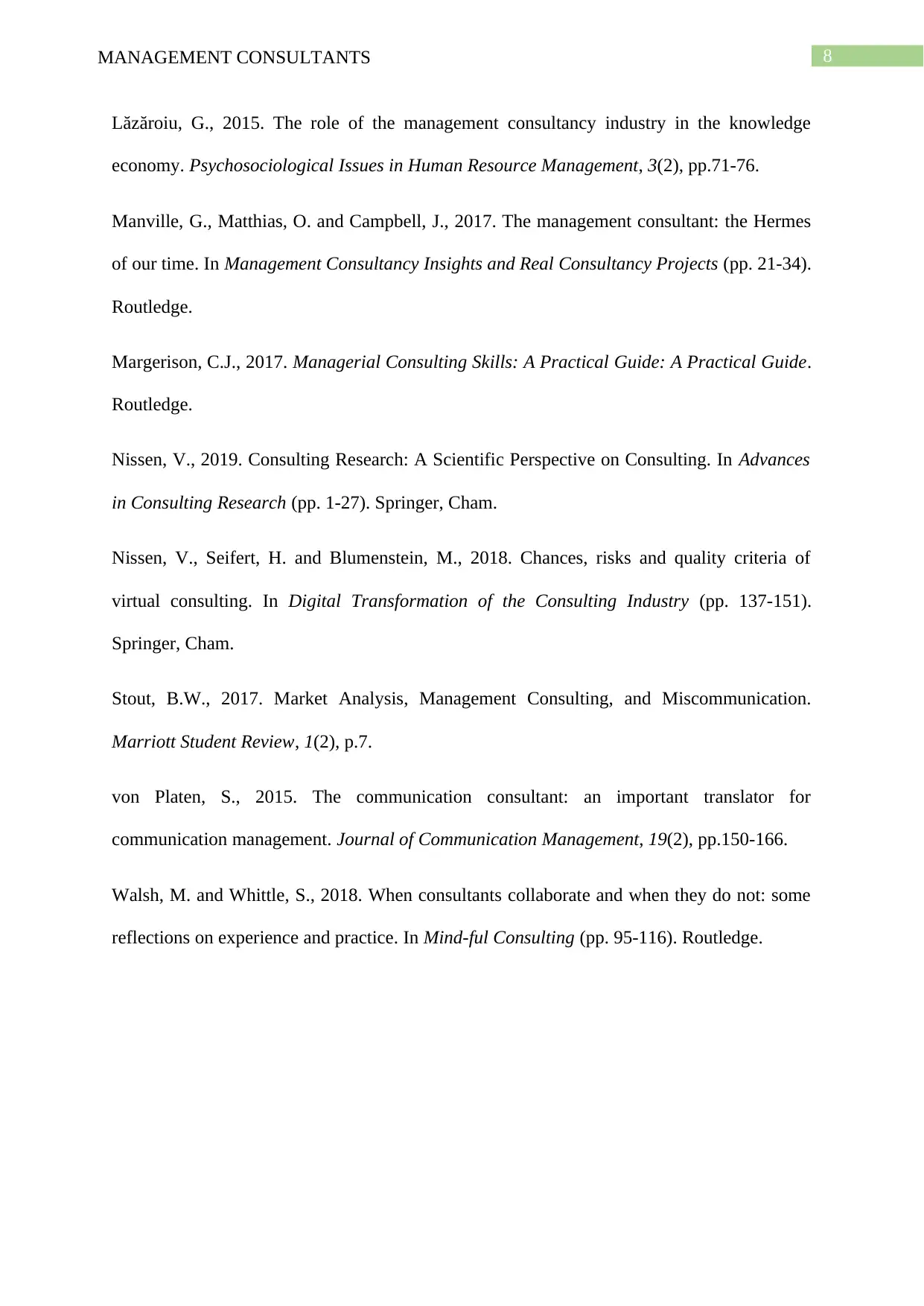
8MANAGEMENT CONSULTANTS
Lăzăroiu, G., 2015. The role of the management consultancy industry in the knowledge
economy. Psychosociological Issues in Human Resource Management, 3(2), pp.71-76.
Manville, G., Matthias, O. and Campbell, J., 2017. The management consultant: the Hermes
of our time. In Management Consultancy Insights and Real Consultancy Projects (pp. 21-34).
Routledge.
Margerison, C.J., 2017. Managerial Consulting Skills: A Practical Guide: A Practical Guide.
Routledge.
Nissen, V., 2019. Consulting Research: A Scientific Perspective on Consulting. In Advances
in Consulting Research (pp. 1-27). Springer, Cham.
Nissen, V., Seifert, H. and Blumenstein, M., 2018. Chances, risks and quality criteria of
virtual consulting. In Digital Transformation of the Consulting Industry (pp. 137-151).
Springer, Cham.
Stout, B.W., 2017. Market Analysis, Management Consulting, and Miscommunication.
Marriott Student Review, 1(2), p.7.
von Platen, S., 2015. The communication consultant: an important translator for
communication management. Journal of Communication Management, 19(2), pp.150-166.
Walsh, M. and Whittle, S., 2018. When consultants collaborate and when they do not: some
reflections on experience and practice. In Mind-ful Consulting (pp. 95-116). Routledge.
Lăzăroiu, G., 2015. The role of the management consultancy industry in the knowledge
economy. Psychosociological Issues in Human Resource Management, 3(2), pp.71-76.
Manville, G., Matthias, O. and Campbell, J., 2017. The management consultant: the Hermes
of our time. In Management Consultancy Insights and Real Consultancy Projects (pp. 21-34).
Routledge.
Margerison, C.J., 2017. Managerial Consulting Skills: A Practical Guide: A Practical Guide.
Routledge.
Nissen, V., 2019. Consulting Research: A Scientific Perspective on Consulting. In Advances
in Consulting Research (pp. 1-27). Springer, Cham.
Nissen, V., Seifert, H. and Blumenstein, M., 2018. Chances, risks and quality criteria of
virtual consulting. In Digital Transformation of the Consulting Industry (pp. 137-151).
Springer, Cham.
Stout, B.W., 2017. Market Analysis, Management Consulting, and Miscommunication.
Marriott Student Review, 1(2), p.7.
von Platen, S., 2015. The communication consultant: an important translator for
communication management. Journal of Communication Management, 19(2), pp.150-166.
Walsh, M. and Whittle, S., 2018. When consultants collaborate and when they do not: some
reflections on experience and practice. In Mind-ful Consulting (pp. 95-116). Routledge.
⊘ This is a preview!⊘
Do you want full access?
Subscribe today to unlock all pages.

Trusted by 1+ million students worldwide
1 out of 9
Related Documents
Your All-in-One AI-Powered Toolkit for Academic Success.
+13062052269
info@desklib.com
Available 24*7 on WhatsApp / Email
![[object Object]](/_next/static/media/star-bottom.7253800d.svg)
Unlock your academic potential
Copyright © 2020–2026 A2Z Services. All Rights Reserved. Developed and managed by ZUCOL.





